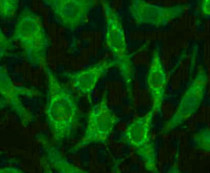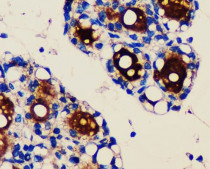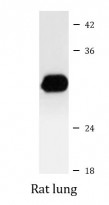ARG42005
anti-UCP1 antibody
anti-UCP1 antibody for ICC/IF,IHC-Formalin-fixed paraffin-embedded sections,Western blot and Mouse,Rat
Overview
| Product Description | Rabbit Polyclonal antibody recognizes UCP1 |
|---|---|
| Tested Reactivity | Ms, Rat |
| Tested Application | ICC/IF, IHC-P, WB |
| Host | Rabbit |
| Clonality | Polyclonal |
| Isotype | IgG |
| Target Name | UCP1 |
| Antigen Species | Human |
| Immunogen | Recombinant fusion protein corresponding to aa. 1-307 of Human UCP1 (NP_068605.1). |
| Conjugation | Un-conjugated |
| Alternate Names | UCP; SLC25A7; Thermogenin; Mitochondrial brown fat uncoupling protein 1; Solute carrier family 25 member 7; UCP 1 |
Application Instructions
| Application Suggestion |
|
||||||||
|---|---|---|---|---|---|---|---|---|---|
| Application Note | * The dilutions indicate recommended starting dilutions and the optimal dilutions or concentrations should be determined by the scientist. | ||||||||
| Positive Control | Rat lung | ||||||||
| Observed Size | ~ 32 kDa |
Properties
| Form | Liquid |
|---|---|
| Purification | Affinity purified. |
| Buffer | PBS (pH 7.3), 0.02% Sodium azide and 50% Glycerol. |
| Preservative | 0.02% Sodium azide |
| Stabilizer | 50% Glycerol |
| Storage Instruction | For continuous use, store undiluted antibody at 2-8°C for up to a week. For long-term storage, aliquot and store at -20°C. Storage in frost free freezers is not recommended. Avoid repeated freeze/thaw cycles. Suggest spin the vial prior to opening. The antibody solution should be gently mixed before use. |
| Note | For laboratory research only, not for drug, diagnostic or other use. |
Bioinformation
| Database Links |
Swiss-port # P04633 Rat Mitochondrial brown fat uncoupling protein 1 Swiss-port # P12242 Mouse Mitochondrial brown fat uncoupling protein 1 |
|---|---|
| Gene Symbol | UCP1 |
| Gene Full Name | uncoupling protein 1 (mitochondrial, proton carrier) |
| Background | Mitochondrial uncoupling proteins (UCP) are members of the family of mitochondrial anion carrier proteins (MACP). UCPs separate oxidative phosphorylation from ATP synthesis with energy dissipated as heat, also referred to as the mitochondrial proton leak. UCPs facilitate the transfer of anions from the inner to the outer mitochondrial membrane and the return transfer of protons from the outer to the inner mitochondrial membrane. They also reduce the mitochondrial membrane potential in mammalian cells. Tissue specificity occurs for the different UCPs and the exact methods of how UCPs transfer H+/OH- are not known. UCPs contain the three homologous protein domains of MACPs. This gene is expressed only in brown adipose tissue, a specialized tissue which functions to produce heat. [provided by RefSeq, Jul 2008] |
| Function | UCP are mitochondrial transporter proteins that create proton leaks across the inner mitochondrial membrane, thus uncoupling oxidative phosphorylation from ATP synthesis. As a result, energy is dissipated in the form of heat. [UniProt] |
| Cellular Localization | Mitochondrion inner membrane; Multi-pass membrane protein. [UniProt] |
| Calculated MW | 33 kDa |
| PTM | May undergo sulfenylation upon cold exposure. May increase the sensitivity of UCP1 thermogenic function to the activation by noradrenaline probably through structural effects. May undergo ubiquitin-mediated proteasomal degradation. [UniProt] |
Images (3) Click the Picture to Zoom In
-
ARG42005 anti-UCP1 antibody ICC/IF image
Immunofluorescence: L929 cells stained with ARG42005 anti-UCP1 antibody at 1:100 dilution.
-
ARG42005 anti-UCP1 antibody IHC-P image
Immunohistochemistry: Paraffin-embedded Rat fat tissue stained with ARG42005 anti-UCP1 antibody at 1:100 dilution.
-
ARG42005 anti-UCP1 antibody WB image
Western blot: 25 µg of Rat lung lysate stained with ARG42005 anti-UCP1 antibody at 1:1000 dilution.








